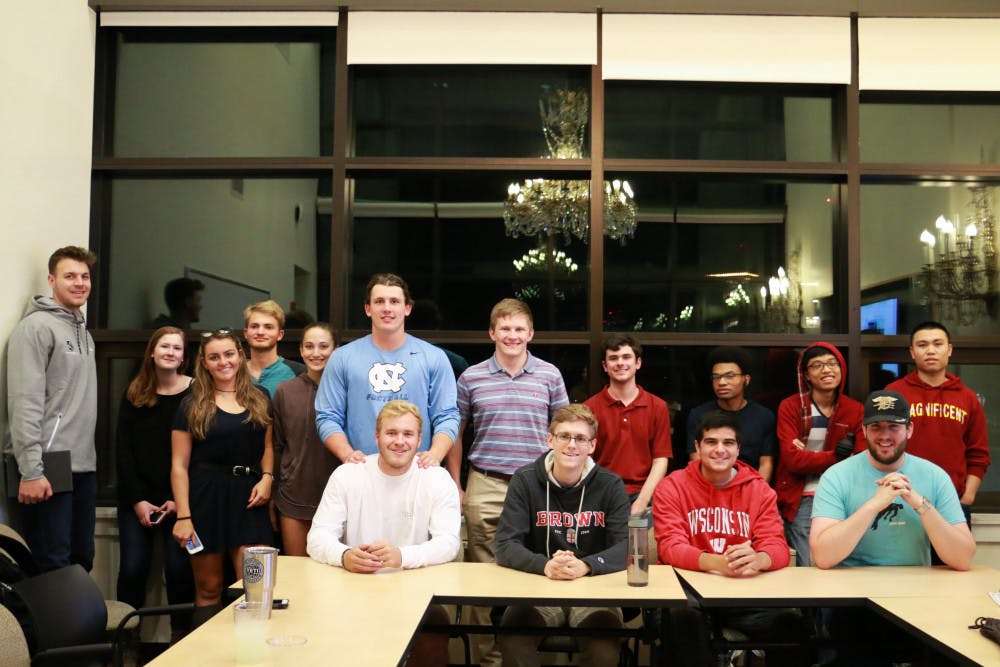In an unusual election year, many College Republican clubs at universities across the country are hesitating or outright declining to endorse Republican presidential candidate Donald Trump. The Brown College Republicans find themselves divided as well.
At a group meeting held Oct. 4, a poll of gathered members revealed only a third had decided to pull the lever for Trump.
The student group is not particularly large to begin with. “Last year we consistently had eight to 15 people come to our meetings,” said Ethan Shire ’19, vice president of the Brown Republicans.
Still, the club’s first meeting this semester drew over 60 attendees. “Midterms are picking up now. But at the beginning of the semester we had ridiculous numbers of people come in,” he said.
“We’re becoming much more active this year because we’re larger, and the (executive) board is more fleshed out,” said Austin Rose ’19, one of the group’s co-presidents. “Independent members also do a lot of work on their own on different political races,” he said, adding that he’s personally been involved with half a dozen campaigns in varying capacities.
Discussion over Trump was far from one-sided in the Oct. 4 meeting. A number of members voiced concern over Trump’s temperament and ability to appeal to independents. Many also considered Trump’s performance in the first presidential debate lacking, said Kelly Conway ’18, one of the club’s presidents.
“We have all ends of the spectrum in the club,” Conway added. There are a number of members in the club who support Trump, and quite a few who view him as preferable to other candidates but are still on the fence about whether or not to back his run. “And then we have some people whose hearts are breaking because of this election,” she said.
Trump’s penchant for inflammatory remarks and total lack of experience in elected office have left Republican students at peer institutions ambivalent as well. The Harvard Republican Club made headlines in August for refusing to endorse Trump, citing his rhetoric as not only “bad politics,” but also “absurdly cruel.” Following the Harvard decision, the Yale College Republicans released an endorsement of Trump, though they declined to list any concrete reasons for their support.
“It’s definitely been an ongoing discussion since the Harvard Republicans released their statement,” Conway said. “We’re going in a bunch of different directions, so we’re waiting till we have a concrete understanding of how our members feel before we act upon anything,” she added.
“Because there’s such underwhelming support of the Republican candidate, we’ve focused our efforts on other races,” Shire said. Shire had spent the previous weekend with other Brown Republicans volunteering in New Hampshire for Kelly Ayotte’s senatorial campaign.
The club makes a point of directing members toward political and campaign opportunities at the beginning of each weekly meeting, though the bulk of meeting time is spent on political and philosophical debate, Conway said. In the Oct. 4 meeting, this included discussion of the future of social security, the economics of toll roads and what social programs government should afford its citizens.
“First and foremost, our club functions as a space for everyone to express their ideas and have these discussions without being criticized or have stereotypes being thrown around,” Conway said. “People can get comfortable and really hash out their ideas without any fear of retribution,” she added.
A number of Brown students said the space offered by the College Republicans is a novel and welcome one, especially on a campus that some perceive to be exclusive of Republican discourse.
“In most rooms I go into, I can be sure of the fact that I’m the only Republican present,” Rose said, adding that it’s easy to feel alone in expressing ideals shared by the Republican Party. “A lot of the way I interact with other people is influenced by the fact that I’m essentially going against what most others think on campus,” he added.
“There are definitely members of the club who have reservations with identifying as Republican, which I completely understand,” Conway said, explaining that the title can come with a number of attached stereotypes. “But we can’t be afraid to identify as Republicans because that hurts everyone in limiting dialogue.”
Streator Bates ’19, a transfer student, acknowledged the liberal reputation Brown has acquired over time but maintained that it didn’t deter him from applying. “If you’re afraid to transfer somewhere because you think you might be shut down for your views, then you clearly don’t believe in your views very strongly,” he said.
“Out there in the real world, there are people who identify as Republicans proudly and aren’t afraid to do so,” Conway said. “This campus should be a microcosm of the greater society and country.”





